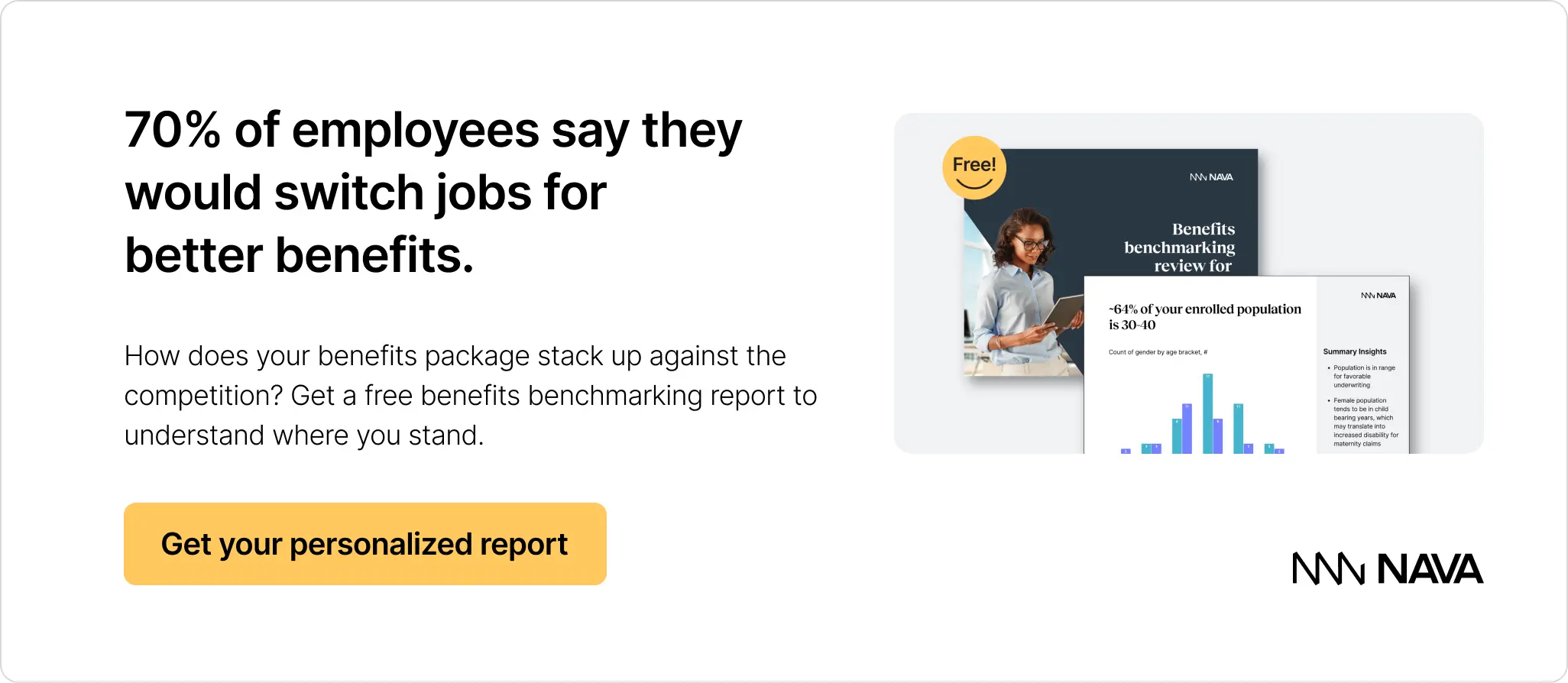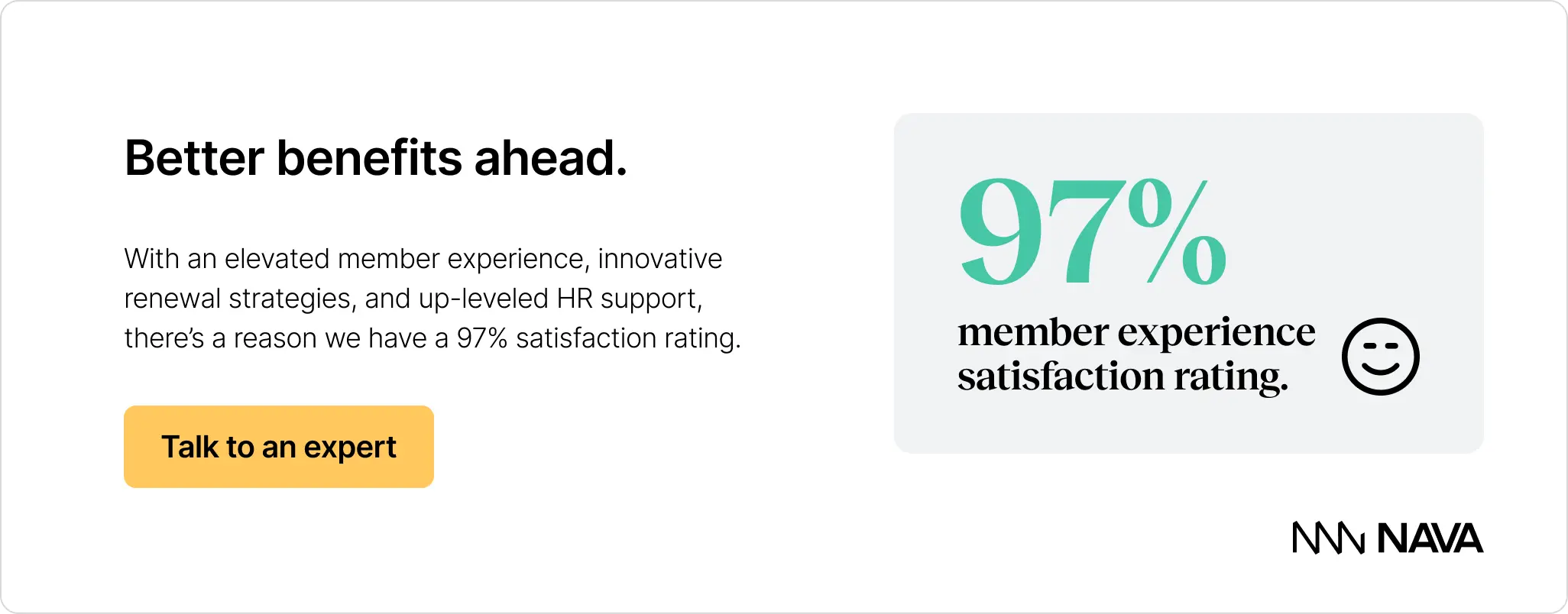What is an employee benefits advisor? Everything HR teams need to know
.webp)
An employee benefits advisor is a strategic partner who helps HR teams design, manage, and optimize benefits programs that align with business goals. The right advisor takes work off your plate, improves employee satisfaction, and keeps your organization competitive in a changing market.
As an HR leader, you’re constantly balancing competing priorities: rising costs, new regulations, and the responsibility to show up for your employees in meaningful ways. Without the right partners, managing benefits can feel like an uphill climb.
That is where a benefits advisor comes in. A benefits advisor (sometimes called a benefits consultant) is a strategic partner who helps employers design, manage, and communicate their employee benefits programs. The right advisor takes work off your plate, strengthens the employee experience, and ensures your benefits investment truly supports your business goals.
What does a benefits advisor do?
At their core, benefits advisors act as a strategic extension of your HR or people team. They take the time to understand your company’s goals, your workforce, and the challenges you face in delivering a great employee experience. From there, they help you develop a benefits strategy that aligns with your business objectives and your employees’ needs.
A benefits advisor works with you year-round, not just during renewal season. They help you stay ahead of cost trends, manage compliance, and adapt your programs as your company and workforce evolve. Their role is not only to manage benefits administration but to keep your entire benefits engine running smoothly.
Common responsibilities include:
- Evaluating and recommending benefit plan options, including medical, dental, vision, and voluntary benefits
- Developing plan design and funding strategies that balance cost control with employee satisfaction
- Managing vendor relationships and ongoing performance to ensure service quality and value
- Benchmarking benefits against industry peers to identify gaps and opportunities
- Negotiating with insurance carriers to secure competitive pricing and favorable terms
- Managing renewals and open enrollment
- Ensuring compliance with federal and state regulations such as ACA, COBRA, and PCORI fees
- Advising on benefits technology and employee communication strategies
A strong employee benefits advisor does more than handle logistics. They bring data, market insights, and proactive recommendations that keep your benefits strategy aligned with your organization’s goals all year long.

Why a benefits advisor is essential to your business
Without an expert partner, managing benefits can quickly become overwhelming. A benefits advisor provides both strategic insight and day-to-day support, allowing HR leaders to focus on people, not paperwork. Here’s how a benefits advisor adds value:
Reduces administrative burden
Benefits advisors save you time and take work off your plate so you can focus on higher-impact priorities. They handle renewals, carrier relationships, and compliance details, managing the day-to-day logistics that often weigh HR teams down. With the right advisor, you can spend less time chasing paperwork and more time supporting your people.
Improves employee experience
Benefits play a major role in how employees perceive their workplace. In fact, 78% of employees say they would leave a job if their benefits package was inadequate.
A great benefits advisor helps you design plans and perks your employees actually value and ensures those offerings are easy to understand and use. When your workforce can confidently navigate their benefits, they feel more supported, satisfied, and invested in your organization.
Keeps you competitive
In today’s talent market, your benefits package can be a decisive factor in whether top candidates choose to join you. In fact, 82 percent of job seekers say the benefits package offered is a significant factor in accepting a job offer.
A benefits advisor helps you stay ahead by:
- Tracking market trends and benchmarking your offerings
- Designing benefits that stand out to prospective talent
- Helping you adjust and optimize perks over time as your workforce evolves
- Aligning benefits strategy with your recruiting and retention goals
With the right advisor, your benefits stop being just a cost center and become a strategic differentiator in the war for talent.
Provides cost control through strategy and insights
Every HR leader is trying to balance high-quality benefits with cost control, and this is where a benefits advisor really shines. They combine data analysis, funding expertise, and strategic negotiation to help you get more value from every benefits dollar. Benefits advisors:
- Review claims and utilization data to uncover cost drivers and identify opportunities for improvement
- Recommend the right funding strategy for your business and budget
- Help you prioritize tradeoffs during challenging renewals
- Benchmark your plans against market data to ensure competitiveness
- Negotiate with carriers and vendors to secure sustainable, long-term pricing
Employee benefits advisor vs. benefits broker
While “benefits advisor” and “benefits consultant” are often used interchangeably, “broker” typically refers to someone who focuses on transactions instead of long-term strategy. That said, the best brokers also act as advisors, taking the time to understand your business and guide you toward smarter benefits decisions.
Here’s how the roles generally differ:
.webp)
Many firms call themselves brokers or consultants, but what matters most is how they operate. The best partners, regardless of title, act as an extension of your HR team, bringing strategic insight, proactive support, and a commitment to helping your employees thrive.
How a benefits advisor improves employee experience
Employee experience doesn’t end when open enrollment closes. The best advisors continue to support your team throughout the year, helping employees navigate their benefits with confidence and care.
A skilled advisor helps you deliver that by:
- Assisting employees when questions or issues arise, such as billing errors, coverage disputes, or claims confusion
- Ensuring employees know where to go for help and how to use their benefits effectively
- Partnering with HR to create clear, accessible communication year-round
- Leveraging technology that simplifies benefits access and self-service support
- Analyzing engagement data to identify and address recurring pain points
When employees feel supported after renewal, their trust in the benefits program grows. They are more likely to appreciate their total rewards package, stay engaged, and view HR as a true advocate for their wellbeing.
How to choose the right benefits advisor
Not all advisors are created equal. When evaluating potential partners, look for these traits:
- Transparency: Clear fee structures and open communication.
- Data-driven approach: The ability to benchmark, analyze, and improve your benefits strategy.
- Technology enablement: Access to tools that streamline enrollment, reporting, and compliance.
- Employee-first mindset: They view benefits as a key part of employee experience, not just cost control.
- Proven partnership: References and case studies showing long-term client success.
Pro tip: Ask potential advisors how they measure success. The best partners will show you real outcomes, from lower costs to higher employee engagement.
The Nava difference
At Nava, we built our advisory model around the needs of modern HR teams. Our advisors combine industry expertise, data-backed insights, and technology to deliver better outcomes for both your business and your employees.





.webp)

